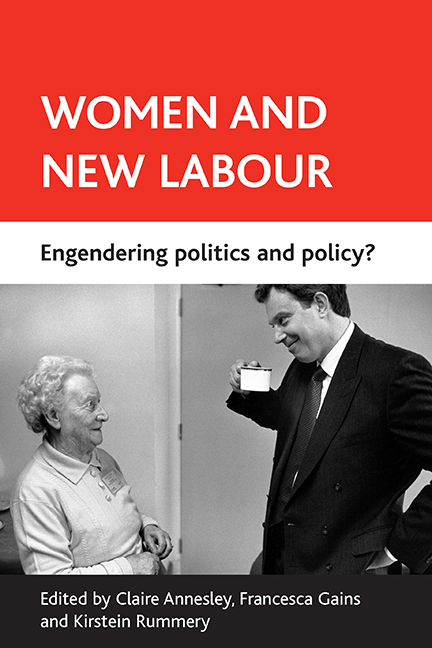twelve - New Labour: towards an engendered politics and policy?
Published online by Cambridge University Press: 15 September 2022
Summary
New Labour: acting for women, taking on women's concerns, making a difference to women's lives?
In commissioning the chapters for this book, we set out to investigate the extent to which New Labour has feminised politics, that is, whether it has acted for women, taken on women's concerns and made a difference to women's lives (Lovenduski 2005). By drawing together the evidence presented here, we have sought to understand why and when the party was able to act for women, what opportunities and constraints they faced, and examine what effects their actions have had on various groups of women. Finally, our aim was to draw some conclusions about how feminists can mobilise governments to achieve feminist aims and how to engender politics and policy.
The evidence presented so far has demonstrated that New Labour has acted for women in some areas, most clearly through policies and initiatives which have improved the representation of women in the formal political sphere. As Lovecy's Chapter Four shows, the party in opposition and in government has taken crucial steps, initiated by feminists and grass-roots initiatives, to improve the representation of women in the party, Parliament and government. As Durose and Gains point out in Chapter Five, the election of New Labour brought with it opportunities for women through the establishment of the Women's Minister and WEU, by way of the project of devolution and, to a lesser but increasingly important extent, the policy instruments designed to encourage gender mainstreaming.
As the case study chapters in this volume illustrate, New Labour, with its increased representation of women and awareness of women's issues, has also taken on women's concerns into public policy in a range of fields from equal pay, to childcare, to development policy. These are significant not only in the context of New Labour's political and policy achievements, but they have also fundamentally altered the perspective of British political parties. This can be seen explicitly in the way the Conservative Party in opposition has taken on family policy and other issues under the broad ‘work–life balance’ heading into the party's policy priorities (Branigan 2006) and has recognised the importance of recruiting more women into politics and attracting women voters (Riddell 2006).
- Type
- Chapter
- Information
- Women and New LabourEngendering Politics and Policy?, pp. 231 - 250Publisher: Bristol University PressPrint publication year: 2007

